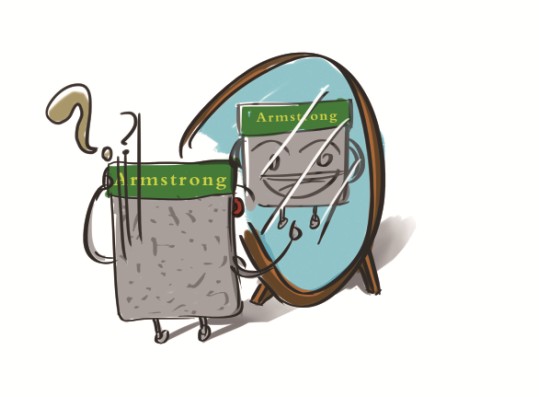
In China’s Trademark Law, similar trademarks and similar goods are the criteria for identifying trademark infringements. Similar goods are the prerequisite for similar trademarks. In practice, there is a quite complex relationship between the registered classification of goods and the actual use of goods, which makes it more difficult to determine the similarity of goods. Recently, Beijing Higher People’s Court made the final decision on the case of trademark infringement and unfair competition dispute between Armstrong World Industries (China) Ltd. and Anhui Armstrong Building Material Co., Ltd. The court dismissed the appeal and upheld the original verdict. Proceedings of the case showed that domestic courts are actively seeking solutions to the problem of determining similar goods.
Case
Armstrong World Industries is the first enterprise to produce mineral wool sound absorbing ceilings, and is currently the world’s largest supplier for such goods. Armstrong World Industries was founded in 1860 in Pittsburgh, PA in the U.S. After 150 years of development it has set up 32 factories in 8 countries, and the total number of employees has reached 9,100. In 2011, its global net sales reached 2.9 billion U.S. dollars (equivalent to about 19 billion yuan), and the company is listed in the Fortune 500.
In 1995, Armstrong World Industries entered the Chinese market and invested 42 million U.S. dollars in establishing the Shanghai Armstrong Building Products Co., Ltd., which was also one of the Ten Major Projects in Shanghai for the year. In the same year, Armstrong World Industries invested and established the Shanghai Worthington-Armstrong Metal Products Co., Ltd. In 2007, Armstrong World Industries invested 20 million dollars in Kunshan and set up the Kunshan Armstrong Wood Co., Ltd.
Over the years, Armstrong World Industries has made investments in China, and developed together with China’s national economy. It has created jobs, increased tax revenue, and accumulated wealth for its own development. As a responsible multinational corporation, Armstrong World Industries has established a good business image in the industry and has gained a high profile in China.
Anhui Armstrong Building Material Co., Ltd. was established in September 5th 2011, and its main business is the production and sale of mineral wool sound absorbing decorative board with the brand of “Armstrong.” The mineral wool board produced by Anhui Armstrong Building Material Co., Ltd. is used for indoor ceiling, and “Armstrong” is used as its trademark and in its trade name, which could easily lead to public confusion. The above acts of Anhui Armstrong Building Materials Co. Ltd. have caused great harm to the market development of Armstrong World Industries in China. Therefore, the U.S. attorneys of Armstrong World Industries repeatedly contacted domestic law firms in search of solutions.
In May 2012, Armstrong World Industries brought a civil tort litigation to Beijing Second Intermediate People’s Court on the grounds of trademark infringement and unfair competition. In view of the complexity of the case, the court, after several hearings, made the first instance verdict in December 2012, finding that the conduct of Anhui Armstrong Building Material Co., Ltd. infringed the earlier registered and well-known “Armstrong” trademark of Armstrong World Industries and constituted unfair competition by using the trade name on infringing products.
Anhui Armstrong Building Material Co. Ltd. was not satisfied with the first-instance verdict and appealed to Beijing Higher People’s Court. In July 2013, Beijing Higher People’s Court dismissed the appeal and upheld the original verdict made by Beijing Second Intermediate People’s Court.
Dispute
The focus of this dispute is that Wang Xiuying, the legal representative of Anhui Armstrong Building Material Co., Ltd., registered the “Armstrong” trademark under Class 17 “mineral wool board (insulation material)” as an individual. In fact, according to the Distinction of Similar Goods and Services (the Distinction) released according to Nice Agreement Concerning the International Classification of Goods and Services for the Purpose of the Registration of Marks (the Nice Agreement), Class 17 does not contain the product name of “mineral wool board (insulation material).” After the registration Wang Xiuying then licensed the trademark to Anhui Armstrong Building Material Co., Ltd., and the “mineral wool sound absorbing board” produced by Anhui Armstrong Building Material Co., Ltd. was used for indoor ceiling decoration. Armstrong World Industries believed that the infringing goods were actually “non-metallic ceiling” goods because of the products’ name, properties, uses and because other features were all connected to ceilings. Anhui Armstrong Building Material Co. Ltd. argued that the alleged infringing goods were “mineral wool boards” as approved in the registered trademark of its legal representative. Of course, the final court lawfully recognized the accused infringing goods were actually goods which were similar to the approved goods covered under the earlier trademark registered by Armstrong World Industries.

